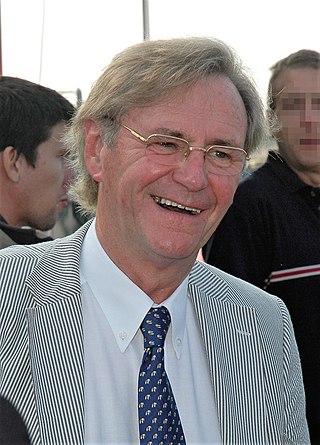This article needs additional citations for verification .(April 2019) |
| Vijftig jaren | |
|---|---|
| Directed by | Ernst Winar |
Release date |
|
| Country | Netherlands |
| Language | Dutch |
Vijftig jaren is a 1948 Dutch film directed by Ernst Winar.
This article needs additional citations for verification .(April 2019) |
| Vijftig jaren | |
|---|---|
| Directed by | Ernst Winar |
Release date |
|
| Country | Netherlands |
| Language | Dutch |
Vijftig jaren is a 1948 Dutch film directed by Ernst Winar.

Simon Carmiggelt was a Dutch writer, journalist, and poet who became a well known public figure in the Netherlands because of his daily newspaper columns and his television appearances.

Willy Naessens is a well known industrialist in Belgium. Naessens grew up in a modest family.

The Bonn Agreement of July 2, 1931 is a formal affirmation which established full communion between the Church of England and the Old Catholic churches of the Union of Utrecht, including the Old Catholic Church of the Netherlands. While it allowed bilateral participation in sacraments, it does not require from either the acceptance of all doctrinal opinions. This communion has since been extended to all churches of the Anglican Communion through their synods.
Lazer Tag Academy is an animated television series inspired by Worlds of Wonder's Lazer Tag that was created by Ruby-Spears Productions. Original episodes aired on NBC from September 13 to December 6, 1986 with reruns lasting until August 22, 1987.

Jaren is the administrative centre of Gran Municipality in Innlandet county, Norway. The village is located about 55 kilometres (34 mi) to the northwest of the capital city of Oslo. The lake Randsfjorden lies about 7 kilometres (4.3 mi) west of Jaren. The village of Brandbu lies about 3 kilometres (1.9 mi) to the northwest and the villages of Ringstad and Gran lie about 4 kilometres (2.5 mi) to the southeast.

Gran Hermano del Pacífico is a television program based on the international Big Brother format produced in the Netherlands by Endemol. It involved three countries within South America.

Finsterwolde is a village in the Dutch province of Groningen, about 7 km northeast of the city of Winschoten. Finsterwolde was a separate municipality until 1990, when it was merged with Beerta into Reiderland. In 2010 Reiderland merged into the municipality Oldambt. The old municipality of Finsterwolde included six small nearby or connecting settlements. These are also taken into account in the population estimate of 2008, without which the actual population, purely based on the centre and new developments, would be 1250. The village is known for the Galery Waalkens.

Pieter Cornelis "Piet" Kraak was a Dutch football goalkeeper and manager. Known for his ferocity in the penalty area, Kraak played most of his senior career for Stormvogels. He also gained 33 caps for the Netherlands national team, including appearances at the 1948 Summer Olympics and 1952 Summer Olympics. After his playing career he worked as a coach, notably at Velox before moving to Denmark where he coached AaB and Holbæk B&I, among others.
Maatstaf was a Dutch literary magazine, founded in 1953 by Bert Bakker. Bakker, who was the magazine's first editor, is credited with bringing in poets such as Ida Gerhardt. The magazine had a reputation for publishing "realist" authors, and was categorized as "neoromantic," one of a number of Dutch literary magazines in an "anti-experimental tradition." Dutch poet Gerrit Komrij, who edited the magazine from 1969 on, was the subject of a themed issue in 1984, and again in 1996, this last time centered on a collection of ten homo-erotic poems he had published in 1978, Capriccio. In that same year, 1996, the magazine, with a new team of editors, was renewed following a "conservative revolution."
August Aimé (Guus) Balkema, or A. A. Balkema, was a Dutch book trader and publisher active in Amsterdam and South Africa. He played a prominent role in the South African publishing world and was included in They shaped our century (1999), a list of the 100 most influential people in South Africa in the 20th century.

The Sovereign Principality of the United Netherlands was a short-lived sovereign principality and the precursor of the United Kingdom of the Netherlands, in which it was reunited with the Southern Netherlands in 1815. The principality was proclaimed in 1813 when the victors of the Napoleonic Wars established a political reorganisation of Europe, which would eventually be defined by the Congress of Vienna.

Jaren Ray Johnston is an American country music and rock singer and songwriter. He is a member of the group The Cadillac Three.

Anton Levien Constandse was a Dutch anarchist author and journalist.

Jaren Walter Jackson Jr., nicknamed "the Block Panther", also known by his initials JJJ, is an American professional basketball player for the Memphis Grizzlies of the National Basketball Association (NBA). He was selected by Memphis with the fourth overall pick of the 2018 NBA draft. In 2023, he was named to his first NBA All-Star team, later winning Defensive Player of the Year that same season. Jackson has led the league in blocks per game in two consecutive seasons. He played college basketball for the Michigan State Spartans.

Jacoba Hol was a Dutch physical geographer. In 1945, she was appointed professor of physical geography at the Geographic Institute at Utrecht University. This made her the first female 'normal' professor in the Netherlands.

Frans Friedrich Ludwig Ulrich Last was a Dutch jurist who served as Attorney General at the Supreme Court of the Dutch East Indies.

"Unforgivable" is a song by Dutch disc jockey and record producer Armin van Buuren. It features vocals and lyrics from American singer, songwriter and actress Jaren. The song was released in the Netherlands by Armind on 12 January 2009 as the third single from van Buuren's third studio album Imagine.
Jaren Thomas Hall is an American football quarterback for the Minnesota Vikings of the National Football League (NFL). He played college football at BYU.
The Bureau Nationale Veiligheid (BNV) was a Dutch security agency that was founded in 1945 and succeeded in 1946 by the Centrale Veiligheidsdienst, which in turn was transformed into the Binnenlandse Veiligheidsdienst (BVD) in 1949.

The Centrale Veiligheidsdienst (CVD) was a Dutch security agency founded in 1946 as the successor to the Bureau Nationale Veiligheid. It was transformed into the Binnenlandse Veiligheidsdienst in 1949.